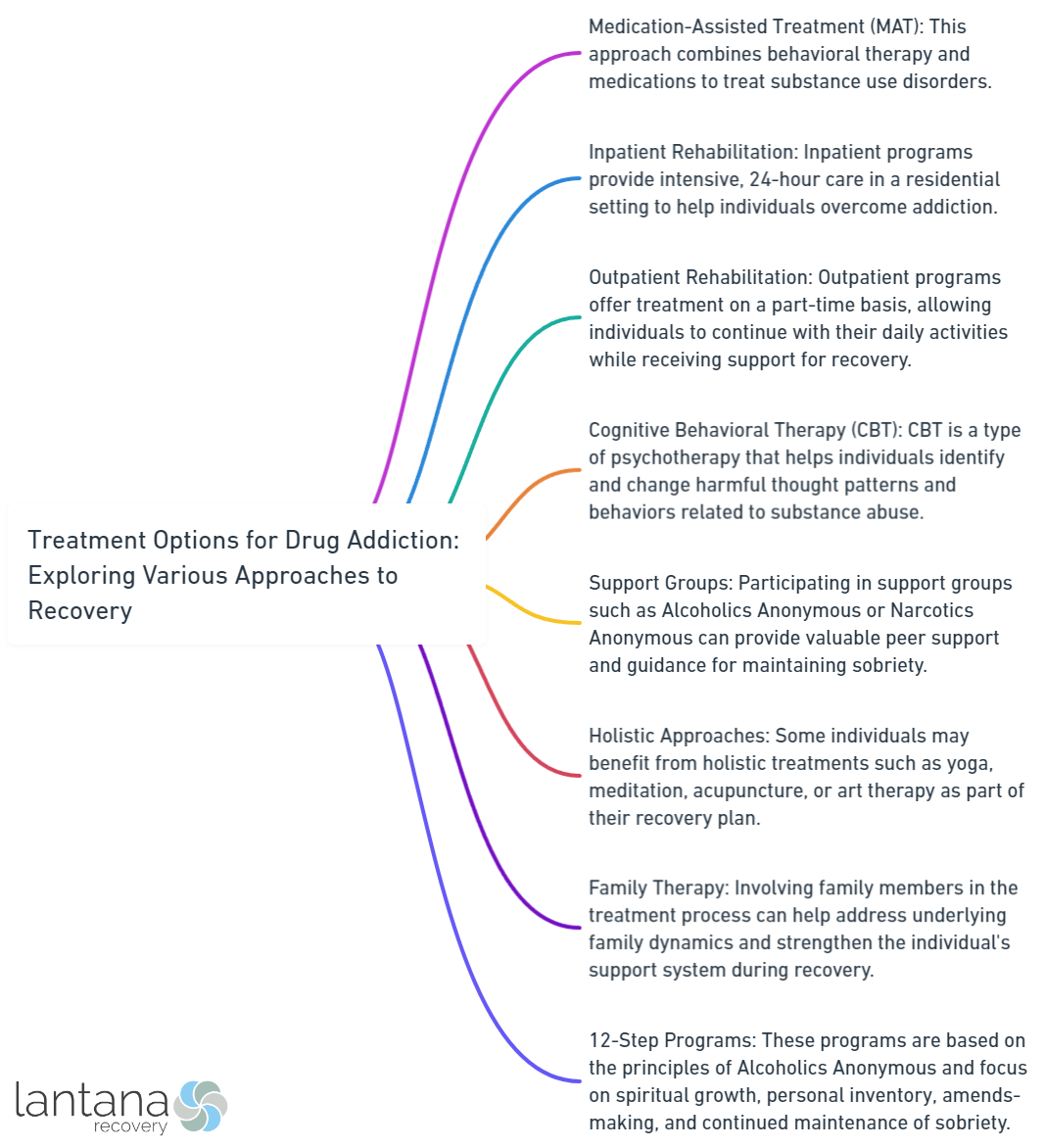Drug addiction is a complex and challenging issue that affects millions of people worldwide. Understanding this condition is crucial in order to provide effective treatment and support for those struggling with addiction. In this article, we will explore various treatment approaches for drug addiction and the potential benefits they offer in the journey of recovery.
To begin, it is important to have a clear understanding of what drug addiction entails. Drug addiction, also known as substance use disorder, is a chronic condition characterized by compulsive drug seeking and use despite harmful consequences. It is a complex interplay of psychological, genetic, and environmental factors that contribute to the development and progression of addiction.
There are several reasons why people may become addicted to drugs. Factors such as genetic predisposition, exposure to trauma, mental health disorders, and social influences can all contribute to the vulnerability of individuals to substance abuse. Understanding these underlying causes can help inform the selection of appropriate treatment approaches.
When it comes to treating drug addiction, there is no one-size-fits-all solution. Different individuals may respond better to different approaches, and a personalized treatment plan is crucial for successful recovery. In this article, we will explore four main approaches to drug addiction treatment.
Selecting the right treatment approach for drug addiction can be a complex process. Factors such as the severity of addiction, the presence of co-occurring disorders, and individual preferences should be taken into consideration. Individualized treatment plans that cater to the unique needs and circumstances of each person are crucial for long-term success in recovery.
In the following sections of this article, we will explore each of the treatment approaches in detail, providing insights into their effectiveness, potential benefits, and considerations for selecting the most appropriate approach for individuals seeking recovery from drug addiction.

Understanding Drug Addiction
Understanding drug addiction is crucial to effectively address this issue. Drug addiction, a chronic disease that affects the brain and behavior, can have devastating consequences. This medical condition involves the brain and is characterized by compulsive drug seeking and use, despite harmful consequences.
Drugs have the ability to alter the brain’s chemistry and disrupt normal communication between brain cells, which leads to intense cravings and a loss of control over drug use. Certain factors, such as genetic predisposition, environmental influences, and mental health disorders, can increase the risk of developing an addiction.
When individuals abruptly stop or reduce drug use, they may experience withdrawal symptoms, which vary depending on the substance and severity of addiction. Treatment for drug addiction should be personalized and may include behavioral therapies, medications, and support systems.
It is important to approach drug addiction with empathy and understanding, recognizing it as a medical condition rather than a moral failing. This approach can help reduce stigma and promote effective treatment and support for those in need.
What is Drug Addiction?
Drug addiction, also known as substance use disorder, is a chronic brain disease characterized by compulsive drug seeking and use, despite harmful consequences. It causes long-lasting changes in the brain, leading to a strong craving for drugs. When a person becomes addicted to drugs, their brain chemistry is altered, affecting their impulse control and decision-making abilities. Drug addiction can occur with both illegal drugs, such as cocaine and heroin, and prescription medications, including opioids and benzodiazepines.
It’s essential to understand that drug addiction is not a moral failing or a lack of willpower; instead, it is a complex health condition that necessitates professional treatment and is primarily caused by genetic and environmental factors.
“A percentage of the population has a biogenetic predisposition to chemicals and/or addictive behaviors; however, early life traumatic experience, such as isolation or abuse, can also contribute to a predisposition to addiction.” (The Disease of Addiction: Origins, Treatment, and Recovery, Angres, Bettinardi, 2008)
Treatment approaches for drug addiction may include medication-assisted treatment, behavioral therapies, support groups, and holistic approaches. Although recovery from drug addiction can be challenging, it is possible with the right treatment and support. Therefore, it is crucial to seek help from qualified professionals who can provide personalized care based on individual needs and circumstances.
Why Do People Get Addicted to Drugs?
Understanding why people get addicted to drugs is crucial in finding effective treatment approaches. Why do people get addicted to drugs? There are several factors that contribute to drug addiction:
-
Biology: An individual’s biological makeup plays a significant role in their susceptibility to addiction. Genetic factors can influence a person’s propensity to develop an addiction. For example, some individuals may have a genetic predisposition to experience intense pleasure from substance use, making them more prone to addiction.
-
Environment: Exposure to drugs, peer influence, and family dynamics can contribute to drug addiction. Growing up in households where drug use is prevalent increases the likelihood of developing substance abuse issues. Additionally, individuals who have experienced trauma or high levels of stress may turn to drugs as a coping mechanism.
-
Psychological factors: Mental health conditions like depression, anxiety, and trauma can increase the risk of substance abuse and addiction. Drugs may be used as a way to self-medicate or escape from emotional pain.
-
Social factors: Social and cultural norms can influence drug use. Individuals surrounded by a social circle that encourages drug use are more likely to experiment and become addicted.
-
Peer pressure: Peer pressure can be a powerful force in leading individuals to try drugs. The desire to fit in or be accepted by a certain group can override the individual’s better judgment, leading to experimentation and ultimately addiction.
It is important to understand that addiction is a complex issue with no single cause. Each individual’s journey into addiction is unique, and addressing the underlying factors that contribute to drug addiction is essential in developing effective treatment approaches.
Treatment Approaches for Drug Addiction
When treating drug addiction, there are several approaches to consider:
- Medication-Assisted Treatment: This approach combines medications with counseling and behavioral therapies to treat substance use disorders. Commonly used medications, such as methadone, buprenorphine, and naltrexone, reduce cravings and withdrawal symptoms.
- Behavioral Therapies: These therapies focus on modifying destructive behaviors and attitudes related to drug use. Effective behavioral therapies include cognitive-behavioral therapy (CBT), contingency management, and motivational interviewing.
- Support Groups and 12-Step Programs: Support groups, like Narcotics Anonymous, and 12-Step programs, such as Alcoholics Anonymous, provide a supportive community for individuals in recovery. These programs emphasize personal accountability, peer support, and spiritual growth.
- Holistic Approaches: Holistic approaches consider the physical, mental, emotional, and spiritual aspects of addiction. Examples include yoga, meditation, acupuncture, and art therapy.
Choosing the right treatment approach depends on factors such as an individual’s unique needs, the severity of the addiction, and personal preferences. An individualized treatment plan should consider these factors and address specific challenges and goals.
Fact: Research shows that combining medication-assisted treatment with behavioral therapies can significantly improve treatment outcomes for individuals with drug addiction. According to a study published in the Journal of Addictive Disorders by David Walters, the treatment abstinence rate for CBT+MAT was almost double (62%) than CBT (36%) alone, when treating alcohol dependence.
Medication-Assisted Treatment
Medication-Assisted Treatment (MAT) is a recognized approach in treating drug addiction. It uses medications along with counseling and behavioral therapies to support recovery.
MAT effectively reduces illicit drug use, overdose deaths, and criminal activity among those struggling with addiction. The medication used in this approach normalizes brain chemistry, alleviates withdrawal symptoms, and decreases cravings.
Medication used in MAT includes methadone, buprenorphine, and naltrexone. Methadone and buprenorphine are controlled opioid agonists, activating the same receptors as opioids. Naltrexone, however, is an opioid antagonist that blocks the effects of opioids in the brain.
Medication treatment for drug addiction should be personalized based on each individual’s needs, and vary depending on the specific substance of addiction. Combining MAT with behavioral therapies like counseling and support groups enhances its effectiveness.
Medication-Assisted Treatment increases the likelihood of successful recovery and improves overall health outcomes for those struggling with drug addiction. It addresses both the physical and psychological aspects of addiction, providing the necessary support to achieve and maintain sobriety.
Behavioral Therapies
Behavioral therapies are essential for treating drug addiction and helping people recover and maintain sobriety. Here are different types of behavioral therapies:
- Cognitive-Behavioral Therapy (CBT): Identify and change negative thought patterns and behaviors linked to drug addiction. Develop healthier coping mechanisms and improve problem-solving skills.
- Contingency Management: Use positive reinforcement to encourage abstinence from drug use. Provide rewards for drug-free urine tests and meeting treatment goals.
- Motivational Interviewing: Collaboratively work with individuals to enhance motivation for change and overcome ambivalence towards treatment. Explore values, goals, and reasons for substance abuse.
- Family Therapy: Involve family members in the treatment process to improve family dynamics, address underlying issues, and create a supportive recovery environment.
- Group Therapy: Offer a non-judgmental environment for individuals to share experiences, learn from others, and build a sense of community. Develop communication skills and provide peer support.
Behavioral therapies effectively address the psychological aspects of addiction, reducing drug use, preventing relapse, and promoting overall well-being. Tailor treatment plans to meet each individual’s specific needs and circumstances.
Studies have suggested that the positive effects of CBT can extend beyond the treatment period. For instance, a study published in 2006 by Kathleen M Carroll from Yale School of Medicine found that 60 cocaine dependent individuals in a randomized control trial, who received CBT for cocaine dependence had lower drug use rates even after a year of treatment.
Support Groups and 12-Step Programs
Support groups and 12-step programs are essential components in helping individuals recover from drug addiction. These support groups offer a safe and empathetic environment for people facing similar challenges. They provide a space where individuals can come together, share experiences, and offer support and empathy. By participating in these groups, individuals feel less alone and find comfort in the collective support.
Similarly, 12-step programs such as Alcoholics Anonymous (AA) and Narcotics Anonymous (NA) play a crucial role in the recovery process. These programs provide a structured approach to recovery and offer guiding principles to maintain sobriety and navigate the challenges of addiction. They offer a framework for individuals to follow and help them develop positive behavioral changes.
Moreover, support groups and 12-step programs foster accountability and responsibility. By actively participating in these programs, individuals take ownership of their actions and commit to working towards positive change. This sense of accountability helps individuals stay focused on their recovery goals.
Furthermore, these programs create a sense of community where individuals can build meaningful connections with others who share similar struggles. This support system offers encouragement, motivation, and friendship throughout the recovery journey. Being surrounded by individuals who understand their challenges can make a significant difference in one’s recovery.
In addition, support groups and 12-step programs often provide mentorship or sponsorship opportunities. Successful individuals in recovery act as guides or mentors for newcomers. This mentorship offers valuable guidance, insights, and encouragement, helping individuals navigate their own recovery process more effectively.
Overall, support groups and 12-step programs are valuable resources that provide the necessary support, guidance, and sense of community for individuals recovering from drug addiction.
Holistic Approaches
Holistic approaches to Drug Addiction Treatment address the entire person, not just addiction symptoms. These Holistic Approaches acknowledge that addiction affects physical, mental, and emotional well-being.
Here are key points about Holistic Approaches:
- Whole-person treatment: Holistic approaches address physical health, mental health, and social well-being. Therapies like counseling, mindfulness practices, and alternative therapies (e.g., acupuncture, yoga) may be used.
- Mind-body connection: Holistic approaches recognize the link between the mind and body. They address mental and emotional factors contributing to addiction and promote overall well-being.
- Individualized treatment: Holistic approaches tailor treatment plans based on the individual’s unique needs, goals, and values.
- Complementary therapies: Holistic approaches integrate complementary therapies with traditional treatments. These may include art therapy, music therapy, or animal-assisted therapy, enhancing well-being and providing additional support during recovery.
- Long-term recovery: Holistic approaches view recovery as an ongoing process. They provide individuals with tools and strategies to maintain lifelong sobriety and improve overall wellness, suggests Kathy Breslin and her colleagues in their study, A holistic approach to substance abuse treatment, published in Journal of Psychoactive Drugs.
Choosing a treatment approach is a personal decision based on individual needs. Consult healthcare professionals and addiction specialists for guidance. Remember, finding the right treatment approach is just the beginning. Active participation and commitment are crucial for long-term success and improved quality of life.

Selecting the Right Treatment Approach
When it comes to overcoming drug addiction, selecting the right treatment approach can make all the difference in one’s recovery journey. In this section, we’ll explore vital factors that come into play when choosing a treatment approach. From understanding the importance of individualized treatment plans to considering various factors in the decision-making process, we’ll uncover key insights to help you navigate the path towards lasting recovery. So, let’s dive in and discover the most effective ways to address drug addiction head-on.
Factors to Consider in Choosing a Treatment Approach
- Type of addiction: Different treatment approaches may be more effective for specific addictions. For example, medication-assisted treatment is commonly used for opioid addiction, while behavioral therapies are often used for alcohol addiction.
- Severity of addiction: The severity of the addiction can also determine the appropriate treatment approach. For severe addictions, a combination of medication-assisted treatment and behavioral therapies may be necessary.
- Personal preferences: Consider your personal preferences when choosing a treatment approach. Some individuals may prefer a holistic approach, while others may prefer a structured program like a 12-step program.
- Support system: A strong support system can impact the success of the chosen treatment approach. Support groups and 12-step programs provide valuable support and accountability.
- Access to resources: Consider the availability and accessibility of treatment resources in your area. This includes healthcare providers, treatment centers, outpatient drug rehabs and support groups.
- Cost and insurance coverage: Treatment costs vary depending on the chosen approach and the specific provider. Consider your financial situation and insurance coverage when selecting a treatment approach.
By considering these factors, you can choose a treatment approach that suits your needs and increases the likelihood of successful recovery from drug addiction.
Individualized Treatment Plans
Individualized Treatment Plans are essential in addressing drug addiction. By catering to the specific needs and circumstances of each individual, the chances of successful recovery are significantly enhanced.
- Assessment: An initial assessment gathers information about the individual’s medical history, addiction severity, and any co-occurring mental health disorders. This helps identify the most appropriate treatment options.
- Customized Treatment Goals: The treatment plan considers the individual’s unique goals and aspirations. Whether it’s achieving sobriety, improving well-being, or rebuilding relationships, the goals are individualized for maximum effectiveness.
- Evidence-Based Interventions: The treatment plan incorporates proven effective interventions such as medication-assisted treatment, behavioral therapies, support groups, and holistic approaches.
- Regular Monitoring and Adjustments: Individualized treatment plans are regularly monitored to evaluate progress and make necessary adjustments. As the individual’s needs change throughout recovery, the plan is modified for the most effective support.
- Support Network: Building a strong support network is an essential part of individualized treatment plans. Family members, friends, or support groups are involved in the recovery process, providing ongoing support and encouragement.
Individualized Treatment Plans provide personalized care and support for individuals to overcome drug addiction and achieve long-term recovery.
Frequently Asked Questions
What are the different treatment options for drug addiction?
There are various treatment options available for drug addiction, including medication and behavioral interventions. Some medications used to get off drugs are buprenorphine, methadone, naltrexone, and a combination of buprenorphine and naloxone can help reduce cravings and prevent relapse for opioid addiction. Behavioral interventions, such as individual or group therapy, can help individuals understand addiction, become drug-free, and prevent relapse. Different levels of care and settings are available based on individual needs, including outpatient programs, inpatient programs, and residential programs.
How is drug addiction diagnosed?
Diagnosing drug addiction requires a thorough evaluation by a psychiatrist, psychologist, or licensed alcohol and drug counselor. Lab tests may be used to assess drug use, but they are not sufficient for diagnosing addiction. Mental health professionals evaluate the nature of addiction, including the types and frequency of drug use, previous attempts to quit, withdrawal symptoms, and readiness for treatment. They rely on the Diagnostic and Statistical Manual of Mental Disorders (DSM) criteria to make an accurate diagnosis.
How does withdrawal therapy work for drug addiction?
Withdrawal therapy, also known as detox, aims to help individuals safely and quickly stop taking drugs. It can be done on an outpatient basis or in a hospital or residential treatment center. Different approaches are used for different categories of drugs. The goal of withdrawal therapy is to manage and alleviate the withdrawal symptoms that occur when stopping drug use. It is an important first step towards recovery, and it is often followed by further treatment options to maintain abstinence.
How can someone find treatment options for drug addiction?
For individuals seeking treatment options for drug addiction, SAMHSA’s National Helpline is a valuable resource. The helpline provides free and confidential assistance, 24/7, 365 days a year. It can be reached at 1-800-662-HELP (4357) or TTY: 1-800-487-4889. The helpline offers treatment referral routing service to local treatment facilities, support groups, and community-based organizations. They can also provide information on state-funded treatment programs, facilities that accept insurance or offer sliding fee scales, and online treatment locators. They do not ask for personal information and can provide resources in both English and Spanish.
Is there a cure for drug addiction?
Currently, there is no cure for drug addiction. However, effective treatments and interventions are available to help individuals overcome addiction and maintain long-term recovery. Ongoing treatment and support are crucial to prevent relapse, including periodic appointments with a counselor, participation in self-help programs or group sessions, and seeking help immediately if relapse occurs. Research is continuously being conducted to develop new treatments, interventions, and diagnostic tests for drug addiction.
How do social determinants of health relate to addiction science?
Social determinants of health, such as living conditions, socioeconomic status, and access to healthcare, are intertwined with addiction science. These factors can contribute to the development of addiction and impact the effectiveness of treatment. Understanding and addressing social determinants of health are important in providing comprehensive and targeted care for individuals with substance use disorders. Research funded by NIDA aims to increase access to evidence-based treatment for specific populations, taking into account the social factors influencing addiction.









